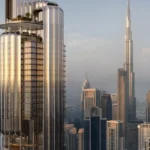Now Reading: CTW Global Real Estate Innovation Ignites Dubai
-
01
CTW Global Real Estate Innovation Ignites Dubai
CTW Global Real Estate Innovation Ignites Dubai

Table of Contents
Dubai recently became the stage for a powerful display of real estate evolution and proptech breakthroughs, when CTW Global convened industry leaders, investors, technologists, and policymakers under one roof. The event not only underscored Dubai’s ambitions to lead in smart property ecosystems but also hinted at where the real estate sector is heading globally.
A Platform for Vision & Transformation
CTW Global is more than a trade fair — it is a crucible of ideas, a hub where innovation meets real-world demand. Strategically hosted in Dubai and backed by MIE Events DMCC, it bridges global ambitions with local execution. Over two days, the event hosted exhibitions, workshops, summits, and matchmaking sessions tailored to the confluence of real estate, technology, and sustainable development.
The real estate and proptech stream featured prominently among these verticals, attracting sharp attention from international startups, development firms, and government bodies. What emerged was a compelling tapestry of how technology is redefining how we build, manage, and inhabit urban spaces.
Trends That Stole the Spotlight
Smart Homes & Integrated Systems
From IoT-enabled lighting and climate control to fully responsive living spaces, exhibitors demonstrated how environments could sense and adapt. The seamless integration of security, energy, comfort, and convenience is transitioning from futuristic concept to baseline expectation.
Green & Sustainable Design
Carbon footprints, energy efficiency, water management — these have become non‑negotiables in new developments. Proptech innovators showcased solutions like building energy analytics, passive design, and modular systems that engage sustainability from day one.
AI‑Driven Property Management
Routine tasks—maintenance, tenant interactions, predictive repairs—are being handed over to artificial intelligence. Models that detect issues before they arise or analyze tenant behavior to improve satisfaction were a major draw.
Virtual Reality & Immersive Sales
The sales pitch is shifting into virtual spaces. VR walkthroughs, 3D models, augmented reality staging — these tools help buyers “visit” even before a foundation is laid. Exhibitors made those experiences richer and more realistic than ever.
Data & Analytics for Investors
Data-first investing is taking over. Heatmaps, market dynamics, predictive valuations — attendees saw tools that turn raw data into prescient decisions. Real estate is becoming as much about algorithms as architecture.

Voices & Participation That Mattered
The event saw participation from over 1,500 delegates representing diverse sectors, more than 100 industry speakers, and delegations from multiple countries. Sessions ranged widely — from policy debates to technical workshops and startup pitches.
Participants included:
- Real estate developers seeking tech partners to scale smarter projects
- Proptech startups showcasing solutions for asset management, fractional ownership, and tenant services
- Investors & funds evaluating the next high-growth play in property tech
- Government agencies & regulators exploring frameworks to support innovation and protect consumers
This mixing of disciplines — design, tech, regulation, finance — created fertile ground for cross‑pollination: ideas that might have been siloed in the past could now find practical collaborators.
Dubai’s Edge: Why the World’s Eyes Are On It
Dubai has long positioned itself as a proving ground for futuristic urbanism. Its willingness to adopt infrastructure leaps, regulatory flexibility, and appetite for risk gives it an advantage. When innovation pilots succeed here, they send ripples across the region.
In the realm of real estate and proptech:
- Dubai’s push for smart city frameworks offers real-world labs for emerging tech
- The market’s scale and investor appetite attract bold experiments
- Its global connectivity draws international participants who want local footholds
- Regulatory openness to new models (for example, tokenization or shared ownership) allows piloting before scaling
At CTW Global, Dubai did not merely host discussions about future cities — it gave glimpses of urban futures in the making.
Challenges & Questions in Focus
While the optimism was abundant, so were the sober conversations about hurdles:
- Interoperability and standards: Different systems often don’t “speak” to each other. Building ecosystems that work seamlessly is still hard.
- Data privacy & security: More connectivity means more exposure. Protecting citizens and assets is critical.
- Affordability vs. luxury bias: Many innovations risk being out of reach for average users. How to democratize the benefits?
- Regulation lag: Policies, land laws, and permitting often trail the pace of technology.
- Scalability & cost: Solutions that work in a showcase or pilot may face cost or infrastructure barriers when expanded.
Speakers and panels acknowledged these obstacles openly — and positioned them as the next frontiers to tackle, not reasons to slow down.
Key Takeaways for Stakeholders
For Developers & Builders
Look beyond aesthetics. Your competitive advantage in coming years lies in systems, integration, and resilience. Choose partners who understand IoT, data infrastructure, and lifecycle performance.
For Proptech Founders
Focus on interoperability, adaptability, and addressing real pain points—not just flashy demos. Your clients want tools that plug into existing workflows and scale gracefully.
For Investors
Don’t just bet on features; bet on moats: strong user adoption, regulatory alignment, ecosystems. Also, watch regions like Dubai as testbeds — breakthroughs here often hint at global breakout opportunities.
For Urban Planners & Policymakers
Encourage sandbox regulatory frameworks, invest in infrastructure (5G, fiber, digital twins), and incentivize innovation that helps public good — energy savings, reduced emissions, better citizen experience.
What’s Next: From Vision to Execution
CTW Global’s role isn’t purely to showcase — it’s meant to catalyze action. The conversations and alliances formed at the event must now translate into pilot projects, funding rounds, regulatory roadmaps, and real deployments.
We can already foresee:
- Proof‑of-concept smart districts where every building communicates and adapts
- Citywide dashboards that monitor energy, mobility, resource usage in real time
- Platforms uniting real estate developers with tech vendors, lenders, and community stakeholders
- Broader adoption of fractional ownership models, tokenization, and democratized investment
- AI agents managing entire residential or commercial estates with minimal human intervention
If those futures feel distant, remember: Dubai is accelerating them now.
Final Thoughts
CTW Global offered more than a snapshot of innovation — it felt like an inflection point. It drew the lines between today’s real estate and tomorrow’s proptech-enabled ecosystems. By tapping into global expertise within a city that lives on the edge of possibility, the event amplified signals about where the sector is heading.
For anyone—investor, developer, technologist, policymaker—pay attention to what came out of CTW Global. Because the ideas exhibited here may well shape the skylines, community dynamics, and living experiences of the next decade.
Do Follow Estate Magazine on Instagram
Dar Al Arkan’s Jeddah Manhattan Plan to Revolutionize Luxury Living



















